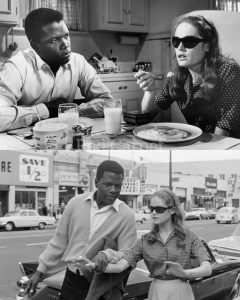The Unscripted Touch That Changed History

During the filming of “A Patch of Blue” in 1965, a moment of profound, unscripted truth unfolded when Sidney Poitier, portraying the kind-hearted Gordon, reached out to Selina, the blind white girl. The script merely called for dialogue, but Poitier, feeling the deep emotional current of the scene, made an instinctive, human choice: he gently reached out and softly touched her face. ❤️

In the racially charged atmosphere of 1960s America, this simple, non-sexual gesture—a Black man touching a white woman on screen—was an act of sheer cinematic bravery that could have easily been deemed scandalous or dangerous. The entire film set went absolutely silent, a collective gasp of realization hanging heavy in the air, recognizing the immense social and political weight of that single, quiet touch. That fleeting moment was a courageous stand against the era’s deeply entrenched racial taboos.
When the filming stopped, the quiet tension in the room remained thick and palpable, a testament to the shocking power of Poitier’s defiant kindness. Executives immediately warned him that the scene would “cause outrage in the South” and urgently pressured him to remove it, fearing widespread boycotts and financial ruin. Yet, Poitier stood firm, his quiet resolve an immovable force against the fear of prejudice, asserting, “If truth offends, then maybe it’s time truth did.” 🗣️ His refusal to back down was not an act of defiance, but a profound commitment to the raw, human truth of the story and the inherent dignity of his character. Elizabeth Hartman, the painfully shy young actress, later admitted that Poitier’s calm strength was her shield, saying, “He didn’t just act with me—he protected me.” 🛡️

Ultimately, Poitier’s courage won: the powerful, unscripted scene remained in the film, although some Southern theaters refused to show it, proving the executives’ fears were not unfounded. Critics, however, hailed the scene as one of the most powerful moments in American cinema, recognizing the universal message it conveyed. Years later, Poitier summed up the moment with stunning simplicity: “That touch wasn’t written. It was human.” ✨ In that single, brave gesture of a hand on a face, Sidney Poitier did far more than challenge Hollywood or society’s bigoted norms; he reminded the world that kindness, dignity, and equality are not radical, complicated concepts—they are, at their very core, fundamentally human ones. His courageous, unwritten act changed more than a film; it truly helped change hearts and history. 🎬
